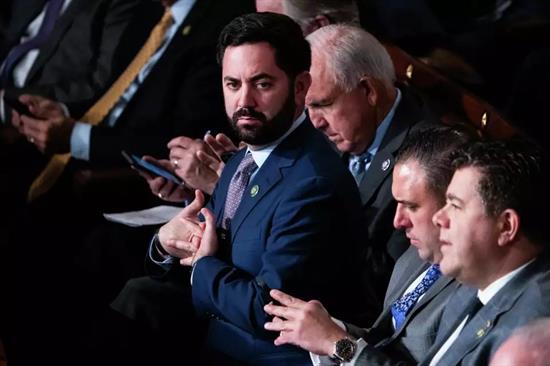In the News
Times Union: House GOP members decry border policies during D.C. hearing
Joshua Solomon,
December 5, 2023
Democrats push back on claims made by GOP at hearing where the migrant crisis focused largely on New YorkNew York congressional Republicans railed against the state and New York City’s response to the migrant crisis during a hearing in Washington, D.C., on Tuesday which was intended to assess how the country’s southern border policies are influencing the ability of communities to respond to the crisis.The hearing, which was not supposed to focus on New York, closed with U.S. Rep. Mike Lawler, a Hudson Valley Republican, and New York Immigration Coalition Executive Director Murad Awawdeh speaking over each other about reforming national immigration policies. “Why in God’s name are we continuing like this?” Lawler said. “The problem here is there isn’t any bipartisan solutions being put forward,” Awawdeh said. Throughout the Emergency Management and Technology Subcommittee hearing, Republicans told witnesses that supporting federal legislation to “secure our border” would help solve the crisis. Democrats countered by encouraging other reforms. Awawdeh called for additional resources to assist with processing people coming into the country to help them lawfully seek asylum. The chair of the committee, U.S. Rep. Anthony D’Esposito, R-Long Island, had on the panel Nassau County Executive Bruce Blakeman, Clinton County Sheriff David Favro, Uniformed Firefighters Association of Greater New York President Andrew Ansbro and Awawdeh. “I am concerned law-abiding taxpayers will suffer and experience delayed services by first responders,” D’Esposito said. Republicans tied spikes in crime to tens of thousands of migrants pouring into New York over the past year, leading to an increased presence of fentanyl and a strain on public dollars to cover the costs associated with the crisis. Democrats cautioned against those GOP characterizations, noting that individuals coming to New York are processed by federal agents, screened for communicable diseases and informed of their upcoming court dates to help determine whether they can stay in the country. “It’s hard to have productive conversation with some on the other side focused on scoring political points,” said U.S. Rep. Troy A. Carter, Sr., the ranking Democratic member of the committee. “That’s not what we’re here for.” The GOP members at the hearing often centered their concerns over so-called sanctuary cities. Blakeman celebrated the fact Nassau County is not a sanctuary community and said that avoiding that designation has helped prevent allowing New York City to relocate migrants to its county. Issues over whether local governments have the authority to restrict another government from sending individuals to a hotel in that community is part of ongoing lawsuits in state and federal court. “This is not a humanitarian program,” Blakeman said. “This is a foreign invasion.” Less attention was given to New York City’s “right to shelter” law, which is the primary reason the city has had an obligation to provide housing for individuals there. The law is a byproduct of a consent agreement the city entered into with the Legal Aid Society 42 years ago. Both the city and the state are fighting in court to weaken that decree. Advocacy groups often point to the policy as the reason why the city does not have a mass homelessness problem that cities like Los Angeles or San Francisco have. Mayor Eric Adams recently announced substantial budget cuts, partly because of the enormous financial strain the city has incurred to meet the demands of the right to shelter law with the influx of migrants. Republicans on the panel in Washington expressed worry that the cuts would shake the ability of first responders to meet the needs of their communities. Favro, of Clinton County, said the migrant crisis is causing a “significant strain on our small, border community.” The Times Union has previously reported about the massive uptick in border crossings upstate — not just at the southern border. “I’d like to assert the city of New York hasn’t communicated, hasn’t coordinated and has exacerbated a humanitarian crisis of its own making into communities all across the state of New York without care or concern for the individuals it suggests its trying to care for — and that is not legal in the state of New York and should not be sustained,” U.S. Rep. Marc Molinaro, R-Catskill, said during the hearing. Gov. Kathy Hochul declared a state of emergency in response to the influx of migrants in May, ahead of a change in federal policy from the Biden administration. The crisis has led to the state committing up to $2 billion to help offset escalating costs in New York City. It has also led to the relocation of migrants, by the city, to upstate communities, including in the Capital Region. The main contractor, DocGo, a publicly traded for-profit company, has appeared to struggle at times to help connect migrants with services they need. Local law enforcement in Albany has said that rates of crime in the hotels where migrants are staying has been down to what it typically is when those hotels have been open to the public. Jackie Bray, commissioner of the state Division of Homeland Security and Emergency Services, was not present at the hearing. “I was not invited to testify at today’s hearing, but had I attended, I would have clearly called out the misguided GOP tactics that are failing New Yorkers, as well as the need for additional federal funding,” Bray said in a statement. |




